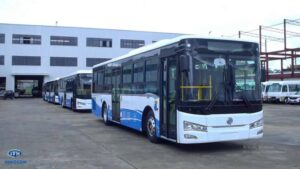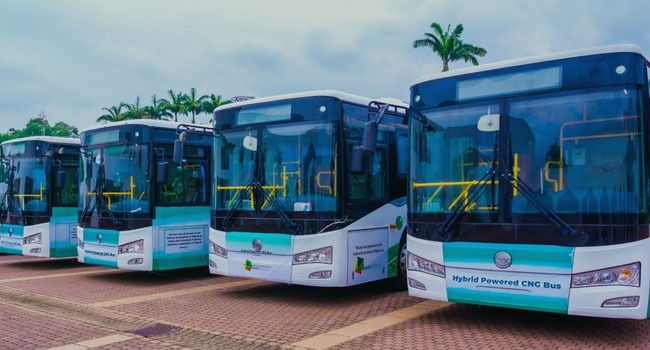In a strategic move aimed at alleviating the economic impact of the recent fuel subsidy removal in Nigeria, the Presidential Initiative on Compressed Natural Gas (CNG) has launched the distribution of 1,000 conversion kits across several states in the country. This initiative is part of a broader effort to promote the use of CNG as an alternative fuel source, aiming to reduce transportation costs and provide a more sustainable option for vehicle owners and commercial transport operators.
At a news conference in Abuja, which marked the beginning of this ambitious project, the Programme Director of the initiative, Michael Oluwagbemi, spoke extensively about the potential benefits and far-reaching impact of this initiative. Oluwagbemi underscored that the primary goal is to bring down transportation costs, which have soared due to the removal of fuel subsidies. By converting vehicles to run on CNG, the initiative hopes to provide an immediate relief mechanism for the general populace, particularly those who rely heavily on public transportation.
 Oluwagbemi elaborated on the scale of the project, revealing an impressive target: the conversion of approximately three million vehicles over the next three years. This ambitious plan, he noted, is not just about making transportation more affordable but also about creating jobs and stimulating economic growth. According to his projections, the initiative is expected to generate over 100,000 direct jobs during the same period. These jobs will be created in various sectors, including the manufacturing and installation of conversion kits, maintenance services, and other ancillary services related to the CNG industry.
Oluwagbemi elaborated on the scale of the project, revealing an impressive target: the conversion of approximately three million vehicles over the next three years. This ambitious plan, he noted, is not just about making transportation more affordable but also about creating jobs and stimulating economic growth. According to his projections, the initiative is expected to generate over 100,000 direct jobs during the same period. These jobs will be created in various sectors, including the manufacturing and installation of conversion kits, maintenance services, and other ancillary services related to the CNG industry.
One of the key highlights of the initiative is the decision to convert commercial transport vehicles free of charge. This move is strategically designed to have a direct impact on the daily cost of transportation for the average Nigerian. By reducing the operational costs for commercial transport operators, the initiative aims to bring down the cost of fares for commuters, thus cushioning the effect of the subsidy removal on the most vulnerable segments of society. This approach reflects a targeted intervention strategy, focusing on sectors that directly affect the livelihoods of millions of Nigerians.
Moses Onate, the Warehouse Manager of the PiCN (Presidential Initiative on Compressed Natural Gas) facility in Ibafo, Ogun State, provided additional insights into the operational aspects of the distribution process. During a briefing at the warehouse, Onate disclosed that the distribution is being carried out under the codename ‘First Come First Serve,’ ensuring an orderly and efficient process. He emphasized that this strategy is crucial in managing the distribution of the conversion kits and ensuring that they reach the intended beneficiaries promptly.
Onate further revealed that out of the 1,000 conversion kits earmarked for distribution, 450 have already been dispatched to various states. The remaining 550 kits are in the pipeline, ready for deployment in the coming weeks. This phased approach to distribution is designed to ensure that the initiative covers a wide geographical area, providing benefits to both urban and rural communities. The goal is to create a widespread adoption of CNG as a viable and cost-effective alternative to traditional petrol, thereby achieving a substantial reduction in the nation’s overall fuel consumption.
Highlighting the advantages of this initiative, Onate urged Nigerians to embrace the use of CNG, pointing out its potential to significantly lower fuel costs for vehicle owners. CNG is not only a more affordable option but also a cleaner alternative to petrol, offering environmental benefits such as reduced emissions and improved air quality. This transition to a more sustainable fuel option aligns with global trends towards cleaner energy sources and underscores Nigeria’s commitment to environmental stewardship.
The conversion kits are ingeniously designed to enable vehicles to run on CNG, thereby offering a dual-fuel system. This means that converted vehicles can still operate on petrol when necessary, providing flexibility and ease of use for vehicle owners. This adaptability is crucial in ensuring the widespread acceptance and success of the initiative, as it allows for a gradual transition rather than an abrupt shift from one fuel type to another.
The launch of the Presidential Initiative on CNG comes at a critical time for Nigeria, as the nation seeks to navigate the economic ramifications of the subsidy removal and explore sustainable energy solutions. The initiative not only provides a practical solution to the immediate challenge of rising transportation costs but also sets the stage for long-term benefits, including job creation, environmental protection, and energy diversification.
By fostering a shift towards CNG, the government aims to reduce the nation’s dependency on imported petrol, thereby conserving foreign exchange and enhancing energy security. This strategic move also aligns with global efforts to reduce carbon footprints and combat climate change, as CNG is known to produce fewer greenhouse gas emissions compared to traditional fossil fuels.
The successful implementation of this initiative could have a transformative impact on Nigeria’s energy landscape, paving the way for a more sustainable and resilient economy. It serves as a reminder of the importance of innovation and forward-thinking in addressing complex national challenges. While the road ahead may require continued effort and public engagement, the Presidential Initiative on CNG marks a significant step in the journey towards a cleaner, more affordable, and more sustainable future for Nigeria’s transportation sector.
In conclusion, the distribution of the CNG conversion kits represents a proactive response to the challenges posed by the subsidy removal, offering immediate relief to transport operators and vehicle owners while laying the groundwork for a more sustainable energy future. The government’s commitment to this initiative underscores the importance of exploring alternative energy sources and highlights the potential of CNG as a viable solution for reducing costs, creating jobs, and protecting the environment. As the program unfolds, its success will largely depend on the level of public participation and the effective implementation of the distribution process, factors that will ultimately determine its impact on Nigeria’s transportation and energy sectors.




